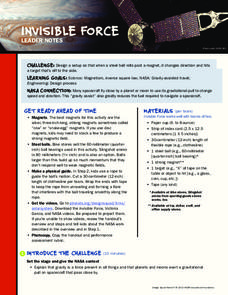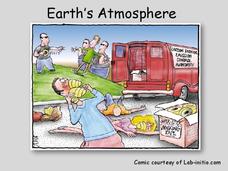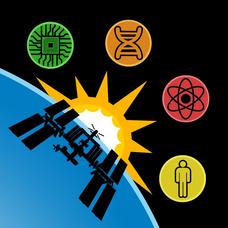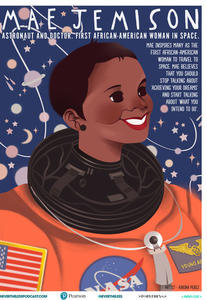Curated OER
NASA Glenn Research Center Mission : High-Speed Civil Transport (HSCT)
High schoolers use World Wide Web resources to identify the problems and advantages of high-speed transportation. They download files and graphics and incorporate them into a word processed report.
Curated OER
Team Moon
Learners read "Team Moon: How 400,000 People Landed Apollo 11 on the Moon," by Catherine Thimmesh. They watch portions of the movie "Apollo 13." Students use the internet and the attached study guide to discover specific information...
PBS
Invisible Force
Investigate invisible forces. Young engineers design a setup that changes the direction of a steel ball using a magnetic force. The purpose of the setup is to model the gravitational pull of spacecraft by planetary bodies.
NASA
Rover Races
Operating a vehicle remotely can be difficult, especially when the vehicle is on another planet. Young engineers get a feel for some of the real-world challenges as they work to program their rovers (blindfolded group members) through an...
Curated OER
What Do I Wear Out Here?
First graders identify the components of a modular spacesuit. In this astronaut clothing lesson plan, 1st graders discuss the importance of appropriate clothing for working in space. Students define the term modular and explore an...
Teach Engineering
Strong-Arm Tactics
Experience collecting rock samples using a robotic arm with an activity that has pairs work together to operate a robotic arm. One pupil serves as the eyes and the other operates the controller. The objective is to be the fastest pair to...
Balanced Assessment
Solar Elements
Let your brilliance shine like the sun. Future mathematicians and scientists consider given data on the abundance of different elements in the sun. The assessment task requires consideration of how these different abundances relate to...
Science Geek
Earth's Atmosphere
Ozone gas absorbs the harmful UV-B rays and helps protect humans. An informative presentation begins with the layers of the earth's atmosphere, the pressure and temperature in each of the layers, the ozone layer, the ozone cycle, and the...
Alabama Department of Archives and History
America in Space: German Voices from Huntsville, Alabama
Project Paperclip, the Redstone Arsenal, and the Huntsville Space Center are all featured in a resource that investigates the contributions of Dr. Werner von Brawn and other German scientists to the US space program. Working individually...
NASA
Space Station Research Explorer
Take a trip into outer space from the safety of your classroom. A great addition to the digital library of any science teacher, this reference offers a behind-the-scenes look at the research going at the International Space Station.
Common Core Sheets
Reading a Timeline
Sometimes the most important details of an informational text aren't within the text at all. Teach your class how to read timeline with a set of activities that prompts them to find specific dates and events on the timelines, as well as...
Mr. E. Science
Manned Space Exploration: From Apollo to Present
How did the manned space mission program progress? The presentation covers American space exploration from the Apollo missions through the International Space Station.
PBS
Light Curves of Kepler's First Five Discoveries
The Kepler missions discovered and confirmed more than 2,650 exoplanets to date. A video shares the data from the first five discoveries. It provides graphs and diagrams to put each discovery in perspective to help scholars discuss the...
PBS
Student Helioviewer Data Tool
Scholars use current satellite data to view solar events, solar features, and so much more. It allows them to make videos over time to observe patterns and visually understand the sun at a much higher level using the interactive that is...
PBS
Data Plots of Exoplanet Orbital Properties
Scientists discovered the first exoplanet in 1995 and by early 2018, they confirmed the existence of more than 3,700—that's a lot of data! As part of the PBS 9-12 Space series, scholars interpret data about exoplanets. They compare...
A Mighty Girl
Gladys West
Teens might find it hard to imagine life before GPS. Using global positioning systems, they can quickly locate the nearest gas station, fast food establishment, or the home of a new friend. Introduce them to Gladys West, the lady who...
A Mighty Girl
Mae C. Jemison
The poster of Mae C. Jemison, the first African-American woman astronaut, challenges young scientists to consider what they intend to do to achieve their dreams.
American Museum of Natural History
Field Trip Mars
Fly around the Martian surface. Pupils view a presentation on the planet Mars featuring a flyover that shows different views of the surface where rovers have landed and explored on different missions. As individuals watch the images, the...
DocsTeach
Challenger Explosion Photograph Analysis
Young historians turn into detectives in a thought-provoking activity on the Challenger Explosion. The activity uses an image of President Reagan watching the Challenger explode on live TV to help academics practice historical analysis....
DocsTeach
Apollo-Soyuz: Space Age Detente
The Space Race saw the Soviet Union and the US go from competitors to partners. Scholars read a letter regarding the first docking of the US and Soviet space craft. Young historians also complete a written assignment and participate in...
American Museum of Natural History
Beyond Planet Earth
Scholars take a journey through space with 16 eye-catching images. Along the way, learners read captions starting with the moon, then move onto asteroids, Mars, and Jupiter.
American Institute of Physics
Meet Four Pioneering African American Astronauts
An out-of-this-world resource introduces young scientists to four African American astronauts: Michael P. Anderson, Ronald E. McNair, Guion S. Bluford Jr., and Jeanette J. Epps. Groups read biographies of these individuals and prepare...
Curated OER
757 Glider Kit
Students work together to complete a 757 Glider kit. They use a GPS to discover how it operates in all weather landings. They complete different obstacles with the glider as well.
Curated OER
Deep Impact Comet On A Stick
Students investigate the concept of a comet. They construct a model of a comet. The design is done using the same thoughts of an engineer. Students work together to discuss the strengths and weaknesses of the comet models. If the model...
Other popular searches
- Nasal Passages
- About Nasa
- Nasa Planets
- Nasa Robots
- Nasa Lesson Math
- Nasa Aircraft
- Nasa Materials
- History of Nasa
- Nasa Lesson Plans
- Nasa Web Based Textbook
- Nasa Aurora
- Contributions of Nasa

























